- Home
- Ian Wallace
Megalomania Page 8
Megalomania Read online
Page 8
In space, en route to Sterbenräuber, he conducted a three-way conference with Flaherty and Kolly. He opened with a brief review: “Good Flaherty, I seem to remember that you can tempigate independently between twenty-five centuries earlier and twenty-five later than zero-level, which is the time-level wherewhen you are released from our mother ship. Correct?”
“Aye aye, sir,” answered the crooning voder.
“Good, in a limited way. Now. Captain Kedrin, as the skipper of Sterbenräuber, tell us how deeply she can plumb uptime.”
“Minister Trigg, our ship is rated for 920 millennia, and she can push it a bit deeper.” Kolly was proper-prim: Flaherty didn’t need to know a damn thing about her personal life. (Flaherty, as it happened, wasn’t programmed to care.) Distressingly, Dino was nettled. His paired hands intertouched fingertips, and his head drooped so that the longest fingertips were supporting his chin just below his pursed lower lip.
The silence, awkward to Kolly, was neutral to Flaherty.
Dino announced: “The kind of time-depth which I require is more on the order of two billion years. Two million millennia.”
There followed a silence of gradual sinking-in and consequent shock on the part of Kolly. (Flaherty’s brain commented privately to Flaherty, TILT! and went on hold.) Said Dino: “Flaherty, proceed to the mother ship, enter, and rest. By the time I reenter you, I will have thought of something.”
Kolly took Sterbenräuber all the way down to her rated maximum of 920,000 years into the past of the Lesser Magellanic Cloud. “Shall I push for more?” she queried.
“Forget it,” Dino told her; “another few thousand millennia would be a spit in the temporal ocean. From here, I can work with Flaherty—so anchor herewhen.”
Somewhat later, having left the yacht in charge of Commandroid Myco, they reentered Flaherty and were injected into uptime space. Kolly, dying to know how and why Dino proposed to go two billion years deeper into uptime, was too intelligent to ask; for when he would be ready, he would be talking.
And he lost no time in saying part of it. “Flaherty, it is time for us to do a two-billion-year timedive. Are you ready?”
“Oh, yes, sir!”
“But, Flaherty—can you do it?”
“Oh, no, sir.”
“And why not, pray tell?”
“Because, sir, I have no gauges for it.”
“But do you know how it feels when you timedive?”
“Oo, yeah!”
“On my signal, then, get that feeling while I do the diving.”
“You, sir?” Flaherty marveled. Kolly was enthralled.
“Just keep remembering this, good Flaherty: no matter what may happen, you have to keep me inside of you, and you have to stay with me to keep me from getting out of you. That will require you to dive with me as deeply as I do—and Captain Kedrin will take upon herself the job of staying with us. Got it?”
“Care for a printout, sir?”
“No. If you think you understand me, say aye aye, sir.”
“Aye aye, sir.”
Kolly interjected: “And how am I supposed to manage the staying with you?”
“Just exist, Kolly: you are already Flaherty-contained, you will automatically stay contained. Flaherty, consider time itself: do you know what time is?”
“Nay nay, sir.”
“Fine; no more do I. Ready?”
In the course of her uptiming, the Sterbenräuber had made a drastic and swift lateral move in space, to a position completely outside the Lesser Magellanic Cloud.
From this viewpoint, not only was Lesser viewed whole with Greater beyond, but also Least, the third cloud invisible from Erth, could be partially descried between Lesser and Greater.
Now also noticeable was a sort of glowing and partially starred ribbon or sweeping mantle between Greater and the others, as though at some time in the past the two smaller clouds had broken away from Greater and moved away leaving behind them a trail of stardust. Generally accepted theory held that precisely this had happened some two billion years in the past. Dino was about to verify that theory in the process of verifying some other cosmic theories—and weaving all of them into explosive pattern.
Something else was visible when you viewed the three clouds in transcolor as Flaherty and Dino and Roily now did. What they now perceived in arousing color-drama were three galactic ion-fountains in hyper-energized upward-downward play, one arising out of the heart of each Magellanic Cloud, fed by and reenergizing the ionic mantle that cocooned each galaxy. In columns of blue-hot plasmic flow, the fountains ascended tens of thousands of light-years into intergalactic celestiality, while in-between columns of somewhat cooler red-hot gas descended back into the mantles. In her stirred fancy, Roily could imagine the ferocity of the supernova explosions, about one per century per galaxy, which powered the spectacular eruptions and therefore wove the transcolor-glowing cocoons.
Dino murmured: “Roily, have you experienced transcolor displays before this one?”
“I should hope so! They’ve been around since the twentieth century, haven’t they?”
“Not quite. Way back then, what they used was called false color; it was added by computer to telemetrically transmitted unicolor photos. But our transcolor is direct imagery with the human visual range expanded to embrace a far wider spectrum of frequencies, enabling us to see these ionic mantles and fountains just as we really would see them if our naked eyes could accept a wider range of light-colors…But that’s enough theory for now. Flaherty?”
“Sir?”
“Be good enough to approach the clouds in such a way that their images on your major viewscreen will be as follows: they will almost fill your screen both laterally and vertically, including the fountains, yet each of the three clouds will continue to be visible.”
Having executed, Flaherty queried: “Shall I hold this position, sir?”
“Hold relative spatial position only, while we are changing temporal position.”
Then, concentrating on continuance of his enwrapment by Flaherty, Dino time-dove. Or, in another phrasing, perversely and with enormous energy expenditure he uptimed profoundly from the already deep uptime position of Sterbenräuber, moving up-current into remote past. And Flaherty did stay with him; and consequently, so did entranced Kolly.
The pastward-travel principle was simple enough, and Kolly had learned to understand it without comprehending it. Advanced tempigation theory was based on the analog that the passing of time ( = the course of germinal development) generates an unending series of concentric event-spheres, with germinal actuality ( = live events) constituting the outermost sphere; while the successively smaller spheres within it are serially older strata of the past, rather like the concentric growth-rings in a cross-section of a tree. Each physical event in its actuality spawns a descendant, perishes, and sinks into past. Necessarily, therefore, the magnitude of each past event shrinks as the fossil of that event sinks deeper.
Then if a germinal being (such as Dino or Kolly or Flaherty) can arrive at sinking into past while maintaining its own magnitude relative to the era of its oxun germinality, it will find that past events shrink with respect to itself, shrink smaller and smaller at deeper and deeper time-levels.*
* A curious reader may find an exception in The Rape of The Sun
And of course there was no reason why Flaherty and its contained party should not maintain magnitude as they invaded the realm of shrinking past events; for the invaders themselves continued being germinal-actual.
The shrinkage phenomena were highly noticeable now in the viewscreens, as Flaherty sank or rose or whatever into the remote past. Relative to any viewscreen, the Magellanic Clouds were degrowing smaller. They maintained their bright images, which seemed to imply one of three alternatives about light-propagation in uptime: either light-propagation continues although all other matter is frozen, or light too is frozen and Flaherty was merely registering photons which happened to be frozen there—or something different f
rom either.
Since Flaherty possessed no deep-range time-gauge, only wild guesses could be made about the number of years or lifetimes by which Dino’s current past-invasion should be measured, now that the galactic images had been reduced until they occupied only a quarter of the prime viewscreen. Trigg’s feeling was, that the temporal depth was not yet enough; so his timedive continued, with sexless Flaherty jealously enwombing him.
Minutes…
The triplex Magellanic Clouds now appeared larger than one bright star among many stars. Dino barked: “Cut pastwarding!” Therethen they were, with Kolly marveling. “We’re getting there,” he told Flaherty. “Center the nebulae on your prime screen, then move in until the screen barely includes all three galactic components, then set yourself to hold that special position and report.” Screen-maneuverings; then a stable positioning. “Done,” said Flaherty, “but we seem to have lost a galaxy.” In fact, although Greater stayed intact, the backtiming process had refused Lesser and Least: again they were one. Just now, in the holographic imagery, the two clouds overlapped but were distinctly separate, with Greater continuing to be larger than Lesser even in close perspective; and the starry dispersal-trail between them was gone. Kolly uttered: “How time-deep, do you think?”
“More than a billion years,” Dino ventured, “on theoretical considerations; but we aren’t there yet. Flaherty, here we go again; keep containing me.” He reentered the timedive, pressing downward or upward or whatever into still deeper past, continually watching the screen.
The two galaxies, momentarily enlarged by Flaherty’s closer approach, now steadily shrank again—and, diminishing, approached each other more and more nearly—until they were like a silver half-credit and a silver quarter-credit, still overlapping laterally and, in the hologram, just barely separate in depth, prevented from coalescing into each other only by the ferocity of their outward momentum imparted by the Big Bang billions of years earlier. And yet it was frozen momentum: in uptime, only germinal invaders like Dino can move. (Croyd had often wondered aloud, in Dino’s presence, whether it was uptime that Parmenides had in mind with his changeless universe—or Einstein with his four-dimensional universe wherein every change was a point on a changeless worldline.) Again Dino had Flaherty approach the twin galaxies until they filled the prime viewscreen. Again they time-dove—until— “There, now!” Dino breathed; and a little exclamation came out of Kolly. For, all of a sudden, the Greater and Lesser Clouds had back-coalesced into a single galaxy which spurted, not mere fountains, but a frighteningly exquisite jet-spume.
“It is,” announced Dino, “as we have long suspected; but until now there was no way to verify it with eyeball finality. At a very early time in the history of the Magellanic Clouds, the time-level which we are now visiting, these galaxies were altogether a single galaxy. But they had originated as separate galaxies; and therefore, when partially random physical forces pulled-and-drove them together, Greater cannibalized Lesser; and the result was the jet-spume that you now see. It continued to spurt for God knows how long; but then somehow, in some catastrophic convulsion, the single galaxy was torn into three. And that was the end of this magnificent jet.
“Kolly, Flaherty, this galactic jet is what we are going to use as the destroyer of all civilization and the possibility of civilization everywhere in Croyd’s beloved Sol Galaxy!”
Kolly chilled—and yet, somehow, she also thrilled; no part of her mind suggested that Dino needed slow killing. She feebly remonstrated: “But the jet is long dead—”
“There are ways,” Dino declared, “of revitalizing it; and Zauberger’s music, correctly deployed, offers us one such way.
“Flaherty, move in on the galaxy.”
*
When Flaherty halted, announcing “Sir, I am one meter off,” in the viewscreen the pastward-recoalesced Magellanic Cloud was no larger than a Fishbowl with a jet-spume that vanished far above the screen. Dino made sure that the screen was adjusted to reflect accurate size without magnification or reduction; then he stood gazing at the image and rubbing hands together.
Here among the galaxy’s deep uptime trace-filaments, had Roboat Flaherty kept moving forward until the roboat would feel contact, Flaherty would never have felt this contact, but would have kept moving forward until the galaxy would have been behind Flaherty—for the galaxy would have passed cleanly through Flaherty and passengers. What looked like a tiny galaxy was really a screen-image of rigidified nuclear traces, of filaments extending from origin to germinality; so thin were these filaments that one of them could slice through a quark without troubling that microparticle one little bit. Slender filaments, yes; yet so massive in terms of inertial mass were those fibers, that nothing germinal could be as massive. Consequently, nothing germinal could budge those fibers—and only germinality has physical power. Hence, even the chromatic jet was unchangeably immobile at any given uptime-moment; it might as well have been a marble sculpture.
(Dino avoided remembering that it was Croyd who had taught him all this.) He inquired of Flaherty: “Can you remember the feeling of this time-depth?”
“Clearly, sir; the feeling is RAM-clear and even subconsciously ROM-latent.”
“For retrieval, label it two billion years negative in ITC units. Do you think that, without my guidance, you can return accurately to this wherewhen?”
“Yo.”
“Could you station other roboats down herewhen, and variously between herewhen and the germinal time-surface, and command them under me?”
“Yes. We all have compatible systems.”
“Could you communicate your feeling of this time-depth, along with the indexicals, to the master computer on the Sterbenräuber, so that Sterbenräuber could achieve this time-depth accurately in the absence of appropriate gauges?”
“I could indeed, sir, sir, sir.”
“Why three sirs?”
“In my engrossment with the problem, I had missed two.”
“I relieve you from ever hereafter saying sir.”
“Why, sir? did I do something wrong?”
“No, you did not; it is only my whim.”
“Sir, what is a whim?”
“Just keep on sirring me. A question occurs: how can you know that I am a sir and not a ma’am?”
“Sir, they built into me an intuition bank for sexual discrimination, whatever that may mean, sir.”
Bizarrely, Dino informed Kolly that he was about to depart Flaherty for an uptime space-walk; she could join him if she chose. She chose. He cautioned her to suit up with special care and to carry as many hours of oxygen as Flaherty’s store of life-support packs could afford her. While she was suiting up, he simply undressed.
Naked except for a throat-mike, carefully he said: “Flaherty, I have certain precise instructions for you; and if you don’t entirely understand them, it is essential that you keep asking questions until you do. The first instruction is, that Captain Kedrin and I are about to depart your interior, but we will return after a few hours of exterior scouting.”
“Sir, I am confused, sir. I thought I was to keep you inside of me no matter what might happen. Well, what is happening is, that you are now ordering me to let you out of me; but am’t I even so supposed to keep you inside of me—sir?” Requiring his temper to stay even, Dino purred: “Good thinking, Flaherty, and you are now at least one sir ahead. Your confusion results from a fault of mine at the start of this, I should have forewarned you that my orders to you would be changing about now. If you wish, we can go back to the time-point just before I gave you that direction, and I can say it again with amendments.” “Wouldn’t that be a lot of trouble, sir?”
“It would indeed, indeed.”
“Then let’s don’t. In return, I will stop calling you sir, usually. I will enter in my stipulative bank that you originally meant to say the order with your present emendations. I now understand that I am to let you go outside of me. But this time it would be wise for you to be very explicit indeed. Can
you now give me the whole program?”
“How many megabytes can you remember and manipulate?”
“Sir, seven to the eleventh power.”
“It is a fine crap-shooting number, Flaherty, but it is too thin for my whole program. Accept this much. When I want to go out of you, stay herewhen and await my return. When I return, let me in, and prepare for the next program-segment. Got it?”
“Yo.”
Under the primordial circumstances, Dino felt a faint chill of hazard—and found it almost sensually arousing. He emphasized: “If I cannot return, possibly Captain Kedrin can; and in my absence, you are to take orders from her—”
She interposed a bite: “In your absence, Minister, Flaherty would do so anyhow.”
“True, Captain; forgive my oversight. Anyhow, Flaherty: if neither of us returns, remain herewhen and await the return of one of us, even if it takes forever.”
“What is forever?”
“Definable only by negations, now I think about it. So no matter how long we stay away, expect the return of one of us, and wait herewhen.”
“I will be true, Minister, although I have never been informed how long it will take my memory to decay.”
“Let us hope that it will outlast our absence. Ready, Kolly?”
“Ready.” She was suitably suited; she wondered at his nakedness, particularly his unheadgeared head, but she asked no questions: Dino was Dino.
He said: “Now, Flaherty.”
The boat replied: “Godspeed, then—whatever that is supposed to mean.”
They were tethered to each other by a ten-meter kamatic field; but never did Kolly let them drift that far apart, despite the unpredictable alacrity of the Trigg space-swimming.
His exuberance propelled him through uptime-space in this profoundly past time-sphere which was contemporaneous with the origin of life on far-distant Earth. Immediately he thrust himself into the soul of the early-embryonic gas which was the horning galactic corona or mantle.

 Megalomania
Megalomania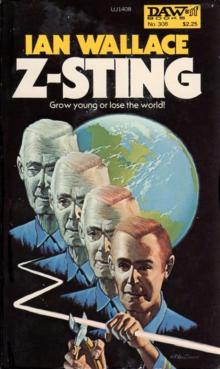 Z-Sting (2475 CE)
Z-Sting (2475 CE)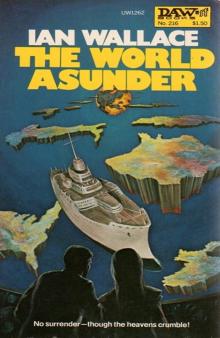 The World Asunder
The World Asunder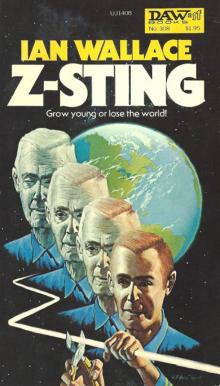 Z-Sting
Z-Sting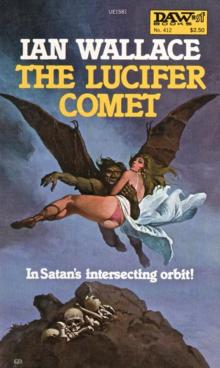 Lucifer Comet (2464 CE)
Lucifer Comet (2464 CE) A Voyage To Dari
A Voyage To Dari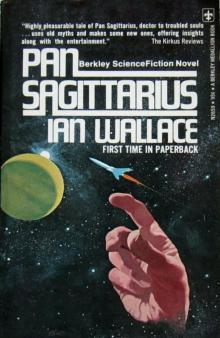 Pan Sagittarius (2509 CE)
Pan Sagittarius (2509 CE)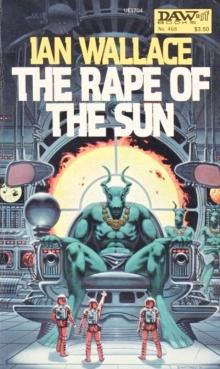 The Rape of The Sun
The Rape of The Sun